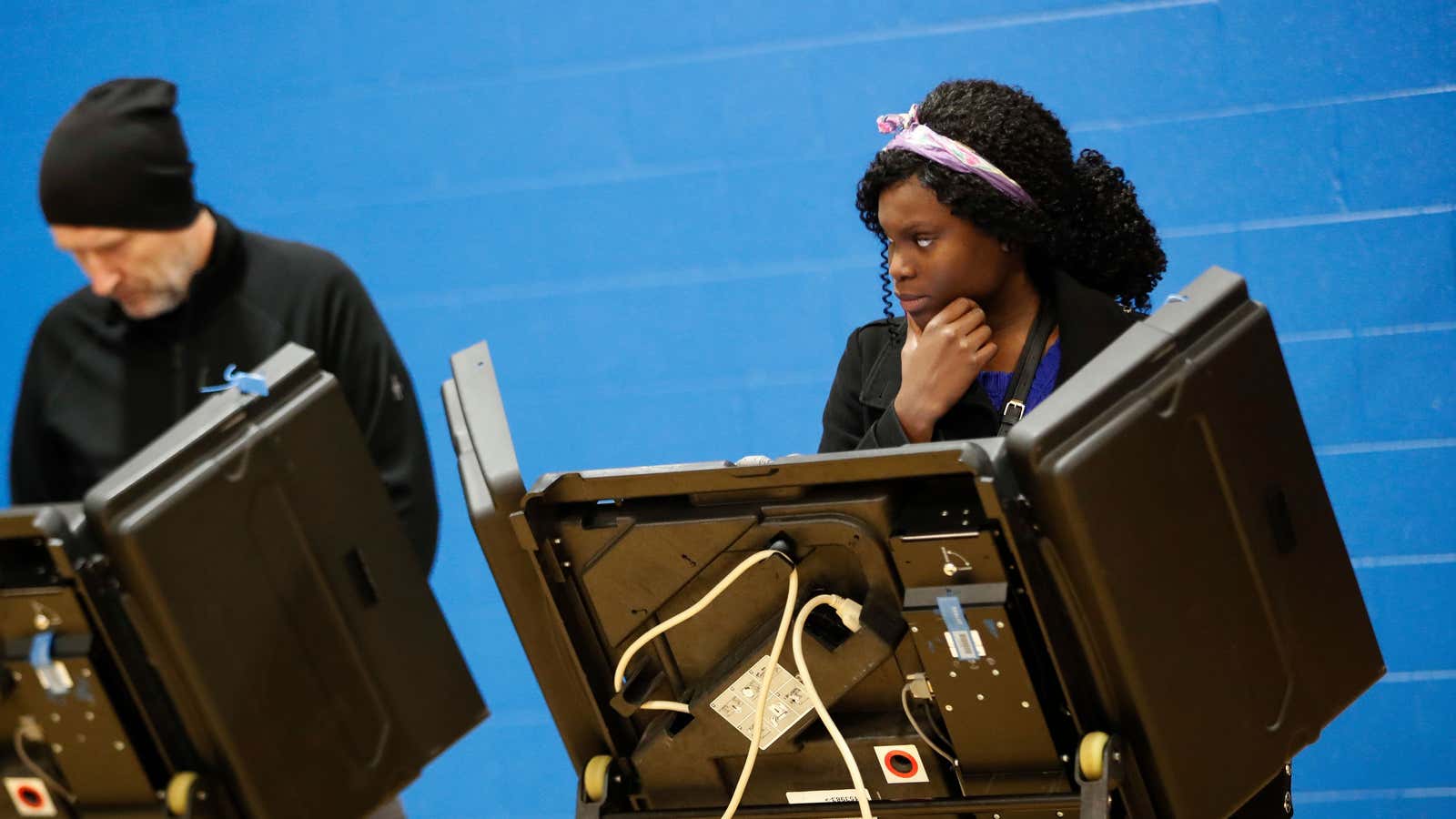There is a lot at stake in today’s US midterm elections (Nov. 6). There are 435 seats in the US House of Representatives up for a vote, and Democrats need to add 25 to their current 193 seats to take the majority (two Democratic representatives left their seats vacant when they passed away). In the Senate, Democrats must defend 23 seats, while Republicans only need to maintain eight seats to keep party majority there. (An additional two Senate seats are currently held by independents who caucus with the Democratic party). And that’s not even counting the hundreds of local and gubernatorial races across the country.
These elections give Democrats a chance to take back Congress, which means they could decide many facets of the future of Americans’ health. According an exit poll conducted by the Associated Press, the majority of voters believe healthcare is the most important issue facing the country, compared with immigration, gun policy, the economy, and the environment. Access to healthcare, securing reproductive rights, and legislation to limit gun violence are some of the main issues drawing millions of Americans out into the rain and onto the lines to cast their votes today.
Most prominently, the fate of the Affordable Care Act may be at stake. Since President Trump took office, the Republican-controlled Congress has been proposing laws to repeal or at least limit the ACA, which provides health care coverage for millions of Americans (paywall). All of the attempts have failed to pass Senate votes, but whatever Congresspeople are elected today will inevitably debate further proposed revisions to the ACA in upcoming terms.
In particular, Democrats are concerned that a Republican-led Congress would repeal one of the ACA’s key components: laws that protect Americans with preexisting conditions from being denied health insurance. Preexisting conditions range from having had cancer to living with type 1 diabetes to things like having had a c-section in the past or having been sexually assaulted.
Although several Republicans have previously supported a full ACA repeal, outrage among parts of their bases seems to have convinced at least some of them, including President Trump, to change their tune (paywall)—or at least to say that they will. Meanwhile, the public response to the threat of being denied coverage has inspired several new Democratic candidates to run on the promise of upholding the ACA, and in some cases, like Mary Gay Scanlon’s campaign for Pennsylvania’s 5th district, to support converting the ACA into a single-payer “Medicare-for-All” program.
At the state level, the future of Medicaid, which provides coverage to low-income adults, could be decided by these elections. The ACA expanded Medicaid to cover even more low-income families, but as a compromise to get the legislation passed, this expansion was structured as an offer to, and not a requirement of, states. Seventeen states have yet to accept the Medicaid expansion. In today’s election, Idaho, Utah and Nebraska will decide if they will expand the program per the ACA; Montana will decide if it wants to continue its Medicaid expansion beyond 2019. The Democratic gubernatorial candidates running in Florida, Wisconsin, Kansas, and Georgia, have indicated their intention to expand Medicaid in their home states if they win, as well.
Access to abortion and reproductive rights are also on the ballots today. Since 2016, there have been at least 13 laws introduced at the state level that would make it harder for women to obtain abortions, Rachel Sussman, national director of state policy and advocacy for Planned Parenthood told Quartz previously. These laws could trigger a Supreme Court case—and now that Brett Kavanaugh has joined the high court’s conservative wing, there is a real likelihood that the it could overturn Roe v. Wade. Oregon, Alabama, and West Virginia are all voting on measures to protect access to abortion in some forms, and it’s a key issue in gubernatorial races in Ohio, Michigan, and Wisconsin.
And finally, there’s gun violence. Historically, gun control has been a polarizing issue, with many right-leaning voters, especially from rural districts, casting their ballots for candidates who promised to keep their access to guns unrestricted. However, the recent spate of mass shootings have made gun control an important issue in even moderate districts, many of which have seen gun-related tragedies play out in their own communities, says Alexander Burns, a politics reporter for the New York Times, on this morning’s episode of “The Daily” podcast. Burns predicts that suburban moderates who may have voted for Republican candidates in the past may be inspired to vote Democratically in the wake of over 300 mass shootings in 2018.
This post has been updated to include information about the Associated Press’ exit poll.
